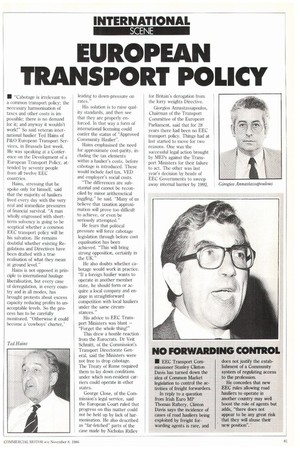EUROPEAN TRANSPORT POLICY
Page 83

If you've noticed an error in this article please click here to report it so we can fix it.
• "Cabotage is irrelevant to a common transport policy; the necessary harinonisation of taxes and other costs is impossible; there is no demand for it; and anyway it wouldn't work!" So said veteran international haulier Ted Hains of MO European Transport Services, in Brussels last week. He was speaking at a Conference on the Development of a European Transport Policy, attended by seventy people from all twelve EEC countries.
Hains, stressing that he spoke only for himself, said that the majority of hauliers lived every day with the very real and immediate pressures of financial survival. "A man wholly engrossed with shortterm solvency is going to be sceptical whether a common EEC transport policy will be his salvation. He remains doubtful whether existing Regulations and Directives have been drafted with a true realisation of what they mean at ground level."
Haim is not opposed in principle to international haulage liberalisation, but every case of deregulation, in every country and in all modes, has brought protests about excess capacity reducing profits to unacceptable levels. So the process has to be carefully monitored. "Otherwise it could become a 'cowboys' charter,' leading to down-pressure on rates."
His solution is to raise quality standards, and then see that they are properly enforced. In that way a form of international licensing could confer the status of "Approved Community Haulier''.
Haim emphasised the need for approximate cost-parity, including the tax elements within a hauher's costs, before cabotage is introduced. These would include fuel tax, VED and employer's social costs.
"The differences are substantial and cannot be reconciled by minor arithemetical juggling," he said. "Many of us believe that taxation approximation will prove too difficult to achieve, or even be seriously attempted."
He fears that political pressure will force cabotage legislation through before cost equalisation has been achieved. "This will bring strong opposition, certainly in the UK."
He also doubts whether cabotage would work in practice. "If a foreign haulier wants to operate in another member state, he should form or acquire a local company and engage in straightforward competition with local hauliers under the same circumstances."
His advice to EEC Transport Ministers was blunt — "Forget the whole thing!"
This drew a hostile reaction from the Eurocrats. Dr Veit Schmitt, of the Commission's Transport Directorate General, said the Ministers were not free to drop cabotage. The Treaty of Rome required them to lay down conditions under which non-resident carriers could operate in other states.
George Close, of the Commission's legal service, said the European Court ruled that progress on this matter could not be held up by lack of harmonisation. He also described as "far-fetched" parts of the case made by Nicholas Ridley for Britain's derogation from the lorry weights Directive.
Giorgios Annastassapoulos, Chairman of the Transport Committee of the European Parliament, said that for 28 years there had been no EEC transport policy. Things had at last started to move for two reasons. One was the successful legal action brought by MEPs against the Transport Ministers for their failure to act. The other was last year's decision by heads of EEC Governments to sweep away internal barrier by 1992.




















































































































